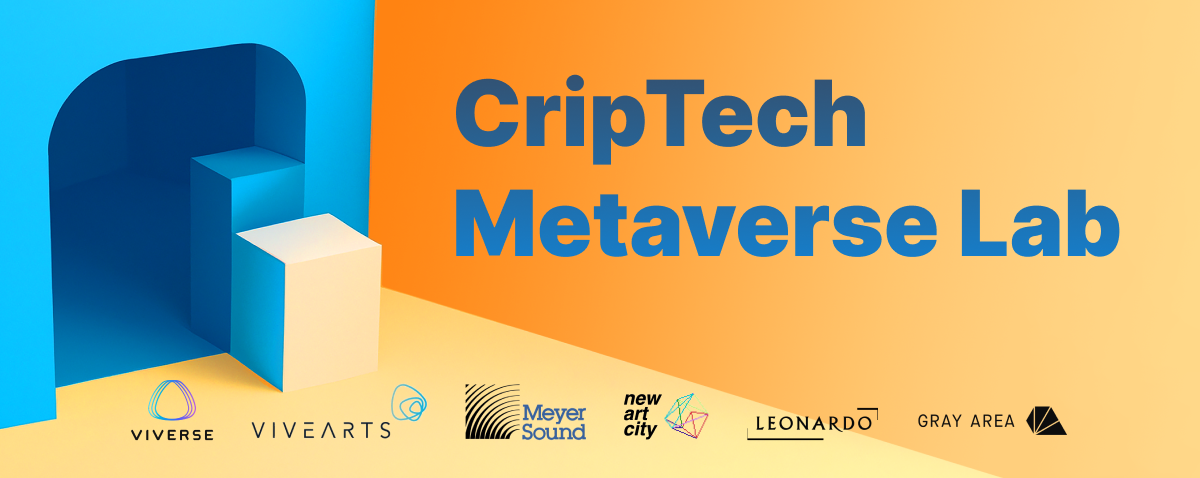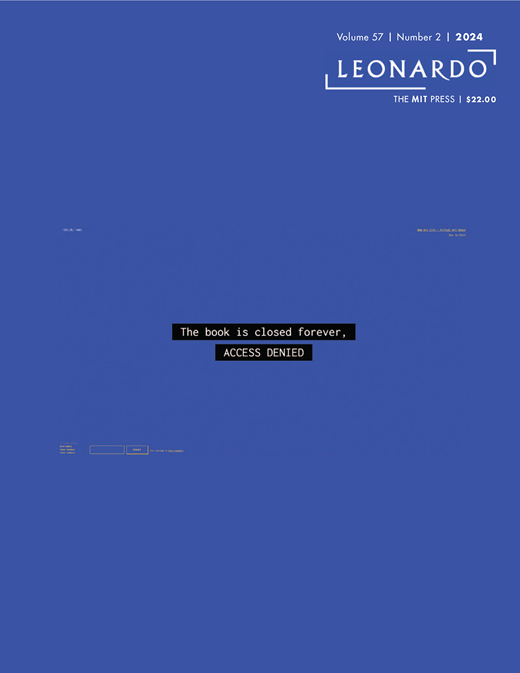
CripTech Metaverse Lab with Leonardo
Immersive media, such as virtual reality, augmented reality, and spatial audio, present significant access frictions and barriers for disabled users and creators. The inaugural CripTech Metaverse Lab, a collaboration between Leonardo and Gray Area, gathered 10 disabled creatives to collectively experience immersive artworks and generate participatory aesthetic access. Convening in February 2023 in the San Francisco Bay Area, the lab imagined new creative pathways for experiencing metaverse artworks amongst participants and future audiences. The findings from this research lab will be shared via the publication of a white paper in Leonardo journal and an online research archive.
Selected from the CripTech Metaverse Lab, artists Indira Allegra, Nat Decker, and Melissa Malzkuhn are developing three VR artworks that explore accessibility and center disability experience. With further technical support from industry production partners VIVE Arts, VIVERSE (HTC), and New Art City, the artwork prototypes will be unveiled at Gray Area Festival: Plural Prototypes, October 19-22nd, 2023.
Two of the works will be developed on HTC's VIVERSE, an immersive platform that empowers people to design their own virtual space. Malzkuhn's project reimagines the concept of the Deaf Club, a vital part of Deaf culture and storytelling globally, within the digital realm; a living weaving that sings, Allegra's Texere will be an immersive platform for collective grief and memorialization. Decker’s TOUCH, produced in collaboration with virtual art space New Art City, will be an interactive poem exploring narratives of the boundaries of physical intimacy and infraction from the perspective of a queer disabled person.

Prototyping Criptech Arts Future
The CripTech Metaverse Lab, and their prototypes, were featured in the most recent publication of Leonardo. The article dives deep into the history of criptech and its importance in a changing world.
Read the full article in Access Denied Volume 57 Issue 2 of Leonardo

DEAF CLUB
By Melissa Malzkuhn
An experimentation in the creation of a VR experience that primarily caters to sign language users—Deaf people. As physical Deaf clubs are dwindling, this serves as a living digital archive for younger generations and a familiar space for older generations to understand the metaverse, and ultimately a place where anyone can visit, learn, gather, share, and connect.

TEXERE: A Tapestry Is A Forest
By Indira Allegra
TEXERE is an art-based mental health app at texere.space that weaves digital memorial tapestries from words and images about people’s losses. “Texere” is a Latin verb that means “to weave”, and is where the words “text” and “textile” originate from. This virtual world offers a contemplative space— like a cathedral of redwoods—for people to reflect on their shared losses together and to attend to their grief hygiene on a daily basis.

TOUCH
By Nat Decker
A virtual 3D world as interactive poem threading narratives about the symbolic and practical boundaries of physical intimacy and infraction as experienced as a queer disabled person. Segments of writing are woven together touching themes such as the mobility device as an extension of the body, the different ways touch is felt, permitted, and violated, corporeal sensations of empathy and more. The non-linearity of experience promotes values of flexibility, slowness, and agency.
METAVERSE LAB COHORT
RESEARCH TEAM
CripTech Metaverse Lab is a collaboration with

Leonardo
Fearlessly pioneering since 1968, Leonardo serves as THE community forging a transdisciplinary network to convene, research, collaborate, and disseminate best practices at the nexus of arts, science and technology worldwide. Leonardo’ serves a network of transdisciplinary scholars, artists, scientists, technologists and thinkers, who experiment with cutting-edge, new approaches, practices, systems and solutions to tackle the most complex challenges facing humanity today. As a not-for-profit 501(c)3 enterprising think tank, Leonardo offers a global platform for creative exploration and collaboration reaching tens of thousands of people across 135 countries. Our flagship publication, Leonardo, the world’s leading scholarly journal on transdisciplinary art, anchors a robust publishing partnership with MIT Press; our partnership with ASU infuses educational innovation with digital art and media for lifelong learning; our creative programs span thought-provoking events, exhibits, residencies and fellowships, scholarship and social enterprise ventures.
Partners

HTC VIVE ARTS
VIVE Arts' mission is to enable experimentation in preserving cultural heritage for the world and to democratize creation through digital innovation in the arts. VIVE Arts harnesses cutting-edge technology to transform the way culture is made, shared, and experienced. Over the past six years, VIVE Arts has pioneered the use of immersive technologies in the art and culture sector, inspiring boundary-pushing artists, creators and leading international institutions to use VR, AR, XR, AI and blockchain for the first time, creating ground-breaking digital artworks and experiences. A leader in the art and technology space, VIVE Arts develops digital innovation projects which preserve the world’s heritage and culture, offering new ways to engage and extend access to wider audiences.

Meyer Sound
Meyer Sound was founded in 1979 to create the best sonic experiences possible, built on scientific innovation and quality engineering. At the heart is a passion for quality, ensuring that every paper cone, circuit board, and driver is handcrafted to meet our extremely demanding standard. We continuously analyze production methods and material selection and exercise exhaustive quality control behind the legendary unit-to-unit consistency, reliability, and longevity of Meyer Sound products. The end result? Pure, honest sound.

The National Endowment for the Arts
The National Endowment for the Arts was established by Congress in 1965 as an independent agency of the federal government. To date, the NEA has awarded more than $4 billion to support artistic excellence, creativity, and innovation for the benefit of individuals and communities. The NEA extends its work through partnerships with state arts agencies, local leaders, other federal agencies, and the philanthropic sector.

Ford Foundation
We believe in the inherent dignity of all people. But around the world, too many people are excluded from the political, economic, and social institutions that shape their lives. Across eight decades, our mission has sought to reduce poverty and injustice, strengthen democratic values, promote international cooperation, and advance human achievement.

California Arts Council
Established by the State of California in 1976, the California Arts Council is a state agency with a mission of strengthening arts, culture, and creative expression as the tools to cultivate a better California for all.


